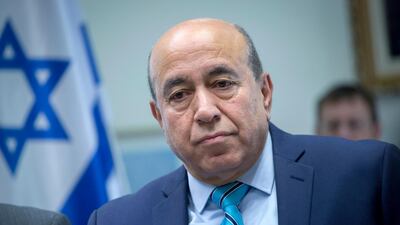An Israeli Arab lawmaker resigned on Saturday and branded the parliament "racist" after it passed a controversial new law which declares Israel the nation state of the Jewish people.
The new legislation speaks of Israel as the historic homeland of the Jews and says they have a "unique" right to self-determination there. It also revokes the longstanding status of Arabic as an official language alongside Hebrew. The law makes no mention of equality and Israel's democratic character, implying the country's Jewish identity takes precedence.
Zouheir Bahloul, of the opposition Zionist Union party, said he could not face telling his grandson that he remained part of the same chamber which passed the law.
"I am resigning from the Knesset," he said on Reshet TV, in reference to Israel's parliament.
"The nation state law officially, constitutionally, removes the Arab population from the path of equality in Israel," he said in Hebrew.
"Should I sit on the fence? Should I give legitimacy to this destructive, racist, extremist parliament?"
Mr Bahloul said that his resignation would officially take effect when parliament returns from its summer recess in September, but he pledged not to reconsider in the meantime.
"I faithfully promise that I shall not go back," he said.
_______________
Read more:
Palestinian teenager Ahed Tamimi freed after eight months in Israeli prison
Israel arrests Italian graffiti artists in West Bank
Israel to build more settler homes after deadly knife attack
_______________
Prime Minister Benjamin Netanyahu on Sunday defended the law, saying it did not harm minority rights despite it lacking references to equality and democracy.
Mr Netanyahu said other laws are already on the books guaranteeing equality for non-Jews and defining Israel as democratic.
"However, we have never determined the national rights of the Jewish people in its land in a basic law – until now, when we passed the nation state law," Mr Netanyahu said at a weekly cabinet meeting.
The law was passed in the middle of the night on July 19 and is part of Israel's so-called basic laws, a de facto constitution.
It has been subject to harsh criticism in parliament and elsewhere. Arab members of parliament have branded the legislation "racist" and ripped up copies of the bill in the Knesset chamber.
Hundreds of Israeli writers and artists have signed a petition calling on Netanyahu to "stop your government and coalition members from scourging minorities" and repeal the law.
Arab citizens make up some 17.5 per cent of Israel's more than eight million population.
Leaders of Israel's 130,000-strong Druze Arab community, which unlike Muslims and Christians is subject to the military draft, have filed a challenge to the law with the country's Supreme Court.
On Friday, Prime Minister Benjamin Netanyahu held talks with Israeli Druze spiritual leader Sheikh Muafak Tarif and a retired Druze general.
Also present at the meeting was Communications Minister Ayoob Kara, a member of Netanyahu's right-wing Likud party. He voted in favour of the law and has since reportedly received death threats.
"There is nothing in this law that infringes on your rights as equal citizens of the state of Israel, and there is nothing in it that harms the special status of the Druze community in Israel," Mr Netanyahu later said on Sunday.

